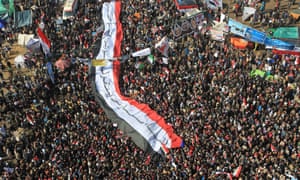http://www.theguardian.com/commentisfree/2015/dec/03/egypt-patriarchy-revolution-egyptians-sisi?utm_source=Sailthru&utm_medium=email&utm_campaign=New%20Campaign&utm_term=%2AMideast%20Brief
Through the revolution, many Egyptians sought to remake the state. Now Sisi is trying to remake the people’s identity by exploiting division
Thursday 3 December 2015 1
Almost 1,000 years ago, under the Fatimid caliphate, which at its height stretched from the Atlantic Ocean in the west to the Arabian peninsula in the east, a potter sat down in his workshop in Cairo and made a bowl. The techniques he used – from the shape of the clay to the metallic glaze and lustre decoration applied after firing – were distinctly Islamic. The priest he painted on the bowl’s interior is unmistakably Christian.
The bowl is one of several objects currently on display at the British Museum that tell a story of flow between faiths in Egypt. In a yellowed letter, nearly a millennium old, a Jewish trader sings the praises of his Muslim business partners; pages from medieval Hebrew and Christian bibles sit side by side with those of an eighth-century Qur’an. Egypt’s history of religious pluralism is rich and nuanced. So too, unfortunately, is the track record of those in power who have exploited and manipulated religious differences down the centuries to serve their own ends.
Today, as the country approaches the fifth anniversary of the start of its revolution, this tension between synthesis and separation is apparent once more.
When the uprising that would eventually topple former dictator Hosni Mubarakerupted in January 2011, it brought Muslims and Christians together, side by side in the streets. Much has been made of the unity Egyptians displayed in their fight against the state’s ageing patriarch and his security forces; what receives less attention is that, for many of those involved, participation in the protests also represented a rebellion against other patriarchs much closer to home: officially sanctioned religious leaders from both faiths who had either ignored the growing unrest or directly prohibited their followers from taking part.
Popular defiance of such orders was part of a new way of thinking about power, both within and beyond the presidential palace, one that has fanned Egypt’s political turmoil ever since. Paternal authority in all its forms – from the family dining table to the church and mosque – has been challenged and subverted during the past half-decade, exposing in the process a critical fault line between large sections of society and the state. Nothing is more dangerous to existing elites than Egyptians who view themselves as autonomous citizens rather than dependants. Hence why, above all else, the counter-revolution has battled to reimpose a culture of control from above and obedience below.
To this end, a virulent strand of chauvinistic nationalism has now been threaded through Egypt’s body politic, emphasising very different fault lines that pose far less threat to the ancien régime. Instead of citizens from diverse faiths and backgrounds linking up to undermine the repressive institutions of the state, the current president, Abdel Fatah al-Sisi, demands a grateful, pliant populace that forms “one hand” with its political elders, while dissenters are banished beyond the realm of the possible, outside the familial fold. Anybody who betokens difference from the norm is at risk of being targeted, including gay men and lesbians, refugees and women undermining traditional gender roles by daring to enact political presence in public spaces.
If homosexuality isn’t illegal, why is there a gay crackdown in Egypt?
Brian Whitaker
Read more
The aim, ultimately, is to underscore a distinction between “us” – those loyal to the president and embraced by the state – and “them”, and to ensure that all Egyptians, regardless of their social identities, fear placement on the wrong side of the line. And just as it has been throughout Egypt’s history, religious division is a key weapon in the state’s armoury. Christians are to be accepted as long as they acknowledge Sisi’s regime as their protector and shield; that means their political voices are arrogated by the conservative church leadership, which was shaken by a wave of internal revolt in the aftermath of Mubarak’s fall but has since reasserted its authority and proved a staunch backer of the authoritarian status quo.
Advertisement
For Egyptians who reject such subordination or exist outside the religious mainstream, Sisi’s Egypt offers no salvation. Shia Muslims have been persecuted; followers of the Baha’i faith continue to faceinstitutionalised discrimination; atheists have been handcuffed and assaulted. All this occurs against the backdrop of a state-prosecuted “war on terror” – a crackdown ostensibly aimed at neutralising a genuine jihadist insurgency playing out in some parts of the country, but one that has included widespread police torture, mass death sentences and the jailing of large numbers of innocent civilians. Meanwhile a new subject, “intellectual and moral security”, has been added to the school curriculum, designed to “reform errant behaviour … and cultivate students’ love of their country”.
Through the revolution, many Egyptians sought to remake the state; through the counter-revolution, the state now seeks to remake the people. The message is that “legitimate” Egyptian identity is to be defined from the top down: what one looks like, who one sleeps with, and what god one prays to are markers of belonging, and everyone is vulnerable to exclusion. Faced with such vulnerability, submission to the patriarch is the safest route of all. Some have accepted this message, others have resisted it with extraordinary courage. Everything remains to play for. As the British Museum’s exhibition reveals, the social bonds between Egyptians are complex and unpredictable – and can sometimes prove sturdier than the rulers who would divide them.
• Egypt: Faith After the Pharaohs is at the British Museum, London WC1B, until 7 February. The British Museum/the Guardian public forum: Coexistence and conflict: can Egypt’s past inform the future? is on 8 December at 7pm. Jack Shenker’s bookThe Egyptians: A Radical Story will be published in January 2016

No comments:
Post a Comment